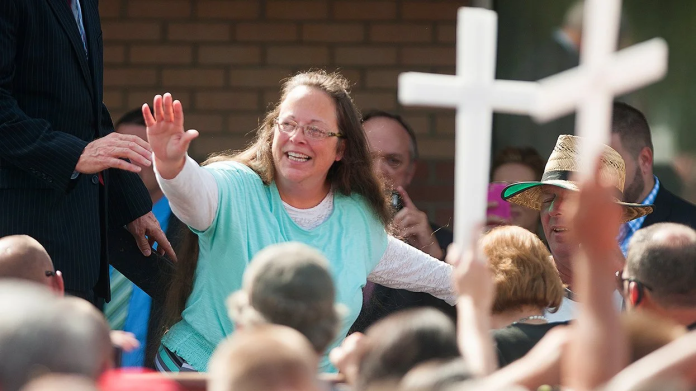Ten years after the Supreme Court extended marriage rights to same-sex couples nationwide, the justices this fall will consider for the first time whether to take up a case that explicitly asks them to overturn that decision.
Legal pushback is underway from Kim Davis, the former Kentucky county clerk who was jailed for six days in 2015 after refusing to issue marriage licenses to a gay couple on religious grounds. She is appealing a $100,000 jury verdict for emotional damages plus $260,000 for attorney’s fees arguing that the First Amendment should shield her from liability for refusing to issue marriage licenses to same-sex couples
The Supreme Court has taken at least one procedural step: it has called for a response from the plaintiffs (the gay couple involved), signaling that at least one justice wanted to consider the case further. Its decision on whether to grant review—i.e., formally hear the case—will likely come this fall, with potential oral arguments next spring and a decision by mid-2026.
However, most experts believe Obergefell is unlikely to be overturned.
LGBTQ+ advocates and legal analysts are cautiously optimistic because Kim Davis’s case is seen as narrow and a poor vehicle for revisiting marriage equality. Walter Olson and Ilya Somin at the Cato Institute argue that, even though conservatives can file cert petitions, there’s little organization or momentum behind undoing Obergefell. They point out the justices needed to both grant review and overturn it are at least four and five votes, respectively—numbers that seem hard to reach.
Most other legal experts similarly assess that revisiting Obergefell is “very unlikely” in the near future, and many note that despite a conservative majority of the Court, strong public support (nearly 70%) and existing statutory protections (like the Respect for Marriage Act) make reversal improbable. Plus, Chief Justice Roberts tends to prioritize court stability and reputation.
Some optimism from the plaintiffs’ side persists though. Kim Davis’s attorney, Mat Staver, claims there’s a “good chance” the Supreme Court will take the case, pointing out that three justices who dissented in Obergefell—Thomas, Roberts, and Alito—are still on the Court. But this remains just one side’s hopeful spin.
But even if Obergefell were overturned there are legal protections that would remain in place. The Respect for Marriage Act (2022) ensures that the federal government and all states must recognize same-sex (and interracial) marriages performed legally in any state, even if Obergefell falls. This means existing marriages would remain legally recognized. However, the Act doesn’t necessarily stop states from passing new laws restricting same-sex marriage if Obergefell is overturned—they could potentially refuse to issue new marriage licenses. So while there is a realistic chance the Court will at least review the petition this fall, most experts say the probability of overturning Obergefell is highly unlikely in the near term.



